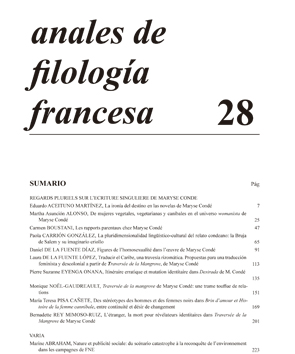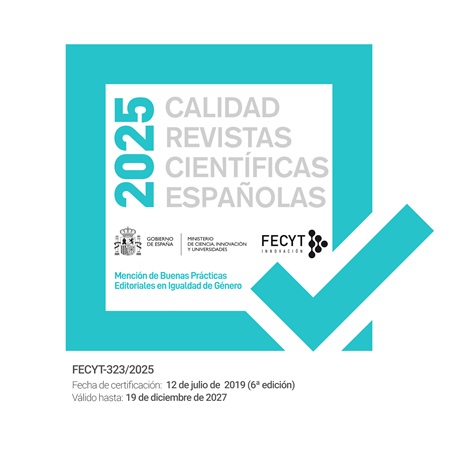Pragmatic awareness in French as a foreign language advanced students: an empirical study
Abstract
The importance of pragmatic competence, which is part of communicative competence, has increased in recent years for foreign language learners in order to help them become communicative competent in a globalised and internationalised world. Nevertheless, this competence is not very present in French as a foreign language (FLE) teaching which leads us to question if learners have pragmatic awareness in the foreign language as this pragmatic awareness plays a key role in its acquisition. The aim of this study is to examine the pragmatic awareness of Spanish advanced students in FLE. Our results show that their pragmatic awareness doenot correlate with their linguistic proficiency, which leads us to reinforce the importance of teaching pragmatic competence in FLE.
Downloads
-
Abstract918
-
PDF (Español (España))718
References
ALCÓN, Eva & María Pilar SAFONT. 2008. "Pragmatic awareness in second language acquisition" in CENOZ, Jasone & Nancy H. HORNBERGER (eds.). Encyclopedia of language and education. Berlin, Springer, vol. 6, 193-204.
ARIEL, Mira. 2010. Defining pragmatics. Cambridge, Cambridge University Press.
BACHMAN, Lye F. 1990. Fundamental considerations in language testing. Oxford, Oxford University Press.
BARDIÈRE, Yves. 2016. "De la pragmatique à la compétence pragmatique. À la recherche d’indices dans le CECRL" in Recherches en didactique des langues et cultures. Les Cahiers de L´Acedle, nº 13-1 <http://journals.openedition.org/rdlc/462>
BARDOVI-HARLIG Kathleen & Zoltan DÖRNYEI. 1998. "Do language learners recognize pragmatic violations? Pragmatic versus grammatical awareness in instructed L2 learning" in TESOL Quarterly, nº 32(2), 233-262.
BARDOVI-HARLIG, Kathleen. 2009. "Conventional expressions as a pragmalinguistic resource: Recognition and production of conventional expressions in L2 pragmatics", in Language Learning, nº 59, 755-795.
BELLA, Spyridoula. 2012. "Pragmatic awareness in a second language setting: The case of L2 learners of Greek" in Multilingua, nº 31, 1-33.
BLUM-KULKA, Shoshana, Juliane HOUSE & Gabriele KASPER (eds.).1989. Cross-cultural pragmatics : Requests and Apologies. Norwood, N.J. Ablex.
BROWN, Penelope & Stephen C. LEVINSON.1987. Politeness : Some Universals in Language Use. Cambridge, Cambridge University Press.
CANALE, Michael. 1983. "From communicative competence to communicative language pedagogy" in RICHARDS, Jack C. & Richard SCHMIDT (eds.) in Language and communication. London, London Group Ltd, 2-27.
CANALE, Michael & Merrill SWAIN. 1980. "Theoretical Bases of Communicative Approaches to Second Language Teaching and Testing" in Applied Linguistics, nº 1(1), 1-47.
CELCE-MURCIA, Marianne, Zoltan DORNYEI & Sarah THURRELL. 1995. "Communicative competence: A pedagogically motivated model with content specifications" in Issues in Applied Linguistics, nº 6 (2), 5-35.
COHEN, Andrew D. 2010. "Coming to terms with pragmatics", in ISHIHARA, Noriko & Andrew COHEN. Teaching and learning pragmatics: where language and culture meet. Harlow, Pearson Education, 3-20.
COHEN, Andrew D. 2018a. "An Introduction to Pragmatics for Learners and Teachers", in COHEN, Andrew D. Learning Pragmatics from Native and Nonnative Language Teachers. Bristol, Blue Ridge Summit, Multilingual Matters, 1-25.
COHEN, Andrew D. 2018b. "Ideas for Teaching Pragmatics and for Motivating Learners", in COHEN, Andrew D. Learning Pragmatics from Native and Nonnative Language Teachers. Bristol, Blue Ridge Summit, Multilingual Matters, 211-240.
COHEN, Andrew D. 2018c. "The Assessment of Pragmatics", in COHEN, Andrew D. Learning Pragmatics from Native and Nonnative Language Teachers. Bristol, Blue Ridge Summit, Multilingual Matters, 125-153.
CONSEJO DE EUROPA. 2002. Marco común europeo de referencia para las lenguas. Aprender, enseñar, evaluar. Madrid, Instituto Cervantes.
CONSEIL DE L´EUROPE. 2018. Cadre européen commun de référence pour les langues. Apprendre, enseigner, évaluer. Volume complémentaire avec de nouveaux descripteurs.<https://rm.coe.int/cecr-volume-complementaire-avec-de-nouveaux descripteurs/16807875d5>
COOK, Misty & Anthony LIDDICOAT. 2002. "The development of comprehension in interlanguage pragmatics: The case of request strategies in English", in Australian Review of Applied Linguistics, nº 25, 19-39.
DALMAU, María Sabaté & Hortensia Curell GOTOR. 2007. "From “sorry very much” to “I’m ever so sorry”: Acquisitional patterns in L2 apologies by Catalan learners of English", in Intercultural Pragmatics, nº 4 (2), 287-315.
DUMITRESCU, Domnita & Patricia Lorena ANDUEZA. 2018. L2 Spanish Pragmatics. From Research to Teaching. London, New York, Routledge.
ESLAMI-RAKESH, Zohreh. 2005. "Raising the pragmatic awareness of language learners" in ELT Journal, nº 59, 199-208.
GARCÍA, Paula. 2004a. "Pragmatic comprehension of high and low level language learners" in Teaching English as a Second or Foreign Language, nº 8, 1-10.
GARCÍA, Paula. 2004b. "Developmental differences in speech act recognition: A pragmatic awareness study", in Language Awareness, nº 13, 96-115.
GEYER, Naomi. 2007. "Self-qualification in L2 Japanese: An interface of pragmatics, grammatical, and discourse competences", in Language Learning nº 57, 337-367.
HOLTTINEN, Tuuli. 2017. "« Passe-moi le sel » vs « Pourriez-vous me passer le sel, s´il vous plaît ? »". Le développement des stratégies de requête chez les apprenants finophones de FLE" in GRANGET, C. , M.-A. DAT, D. GUEDAT-BITTIGHOFFER et C. CUET, Connaissances et Usages en L2, Knowledge and Usage in L2, SHS Web of Conferences,38. <https://www.shsconferences.org/articles/shsconf/abs/2017/06/shsconf_couls2016_00004/shsconf_couls2016_00004.html; 4/04/2020]>
HYMES, Dell. 1972. "On communicative competence ", in PRIDE, John B. & Janet HOLMES (eds.). Sociolinguistics. Harmonsworth, Penguin, 269-293.
ISHIHARA, Noriko. 2010a. “Collecting data reflecting the pragmatic use of language”, in ISHIHARA, Noriko & Andrew D. COHEN. Teaching and learning pragmatics: where language and culture meet. Harlow, Pearson Education, 99-122.
ISHIHARA, Noriko. 2010b. “Theories of language acquisition and the teaching of pragmatics”, in ISHIHARA, Noriko & Andrew D. COHEN. Teaching and learning pragmatics: where language and culture meet. Harlow, Pearson Education, 99-122.
ISHIHARA, Noriko. 2010c. “Assessment of pragmatics in the classroom ”, in ISHIHARA, Noriko & Andrew D. COHEN. Teaching and learning pragmatics: where language and culture meet. Harlow, Pearson Education, 99-122
ISHIHARA, Noriko & Andrew COHEN. 2010. Teaching and learning pragmatics: where language and culture meet. Harlow, Pearson Education.
KERBRAT-ORECCHIONI, Catherine.1992. Les interactions verbales (vol. II). Paris, A. Colin.
KERBRAT-ORECCHIONI, Catherine. 2005. "Politeness in France: How to Buy Bread Politely", in HICKEY, Leo & Miranda STEWART. Politeness in Europe, Clevedon, Buffalo, Toronto, Multilingual Matters, 29-44.
LEECH, Geoffrey N. 1983. Principles of pragmatics. London, Longman.
MARTÍNEZ-FLOR, Alicia & Eva ALCÓN. 2007. "Developing pragmatic awareness of suggestions in the EFL classroom: A focus on instructional effects" in Canadian Journal of Applied Linguistics/Revue canadienne de linguistique appliquée, nº 10 (1), 47-76.
MARTINS, Cidalia & Jean-Jacques MABILAT. 2016. Guide de communication en français. Didier.
NIEZGODA, Kimberly & Carsten ROEVER. 2001. "Pragmatic and grammatical awareness: A function of learning environment?", in ROSE, Kenneth & Gabriele KASPER (eds.). Pragmatics in language teaching. New York, Cambridge University Press, 63-79.
PEARSON, Lynn. 2018. “L2 Spanish pragmatics instruction at the novice level: Creating meaningful contexts for the acquisition of grammatical forms” in DUMITRESCU, Domnita & Patricia Lorena ANDUEZA. L2 Spanish Pragmatics. From Research to Teaching. London, New York, Routledge, 214-231.
RAFIEYAN, Vahid. 2014. "Effect of Pragmatic Awareness on Comprehension and Production of Conventional Expressions" in Theory and Practice in Language Studies, vol. 4, nº 7, 1352-1358.
RUIZ DE ZAROBE, Leyre. 2014. “Pour une introduction de la pragmatique dans l’enseignement du français en Espagne”, Synergies Espagne, nº 7, 133-143.
RUIZ DE ZAROBE, Leyre. 2019. “Enseñar la competencia pragmática”, in RUIZ DE ZAROBE, Leyre & Yolanda RUIZ DE ZAROBE, Enseñar hoy una lengua extranjera. Barcelona, Octaedro, 140-183. <https://octaedro.com/wp-content/descargas/30809-Ense%C3%B1ar-hoy-una-lengua-extranjera.pdf>
SCHAUER, Gila. 2006. "Pragmatic awareness in ESL and EFL contexts: Contrast and development" in Language Learning , nº 56, 269-318.
SCHMIDT, Richard W. 1993. "Consciousness, learning and interlanguage pragmatics", in KASPER, Gabriele & Soshana BLUM-KULKA, Interlanguage pragmatics. Oxford, Oxford University Press, 21-42.
SCHMIDT, Richard W. 2001. "Attention", in ROBINSON, Peter (ed.). Cognition and second language instruction. Cambridge, Cambridge University Press, 3-32.
TAGUCHI, Naoko. 2009. Pragmatic competence. Berlin, New York, Mouton de Gruyter.
TAGUCHI, Naoko. 2015. "Instructed pragmatics at a glance: Where instructional studies were, are and should be going" in Language Teaching, nº 48 (1), 1-50.
TAKAHASHI, Satomi. 2015. "The effects of learner profiles on pragmalinguistic awareness and learning" in System, nº 48, 48-61.
THOMAS, Jenny.1983. "Cross-cultural pragmatic failure" in Applied Linguistics, nº 4(2), 91-112.
WANARUK, Anchalee. 2008. "Pragmatic transfer in Thai EFL refusals", in RELC Journal, nº 39(3), 318-337.
WYNER, Lauren. 2018. "The Development of Pragmatic Ability" in COHEN, Andrew D. Learning Pragmatics from Native and Nonnative Language Teachers. Bristol, Blue Ridge Summit, Multilingual Matters, 26-56.
XIAO, Feng. 2015. "Proficiency effect on L2 pragmatic competence" in Studies in Second Language Learning and Teaching, nº 5 (4), 557-581.
Las obras que se publican en esta revista están sujetas a los siguientes términos:
1. El Servicio de Publicaciones de la Universidad de Murcia (la editorial) conserva los derechos patrimoniales (copyright) de las obras publicadas, y favorece y permite la reutilización de las mismas bajo la licencia de uso indicada en el punto 2.
2. Las obras se publican en la edición electrónica de la revista bajo una licencia Creative Commons Reconocimiento-NoComercial-SinObraDerivada 3.0 España (texto legal). Se pueden copiar, usar, difundir, transmitir y exponer públicamente, siempre que: i) se cite la autoría y la fuente original de su publicación (revista, editorial y URL de la obra); ii) no se usen para fines comerciales; iii) se mencione la existencia y especificaciones de esta licencia de uso.
3. Condiciones de auto-archivo. Se permite y se anima a los autores a difundir electrónicamente las versiones pre-print (versión antes de ser evaluada) y/o post-print (versión evaluada y aceptada para su publicación) de sus obras antes de su publicación, ya que favorece su circulación y difusión más temprana y con ello un posible aumento en su citación y alcance entre la comunidad académica. Color RoMEO: verde.











